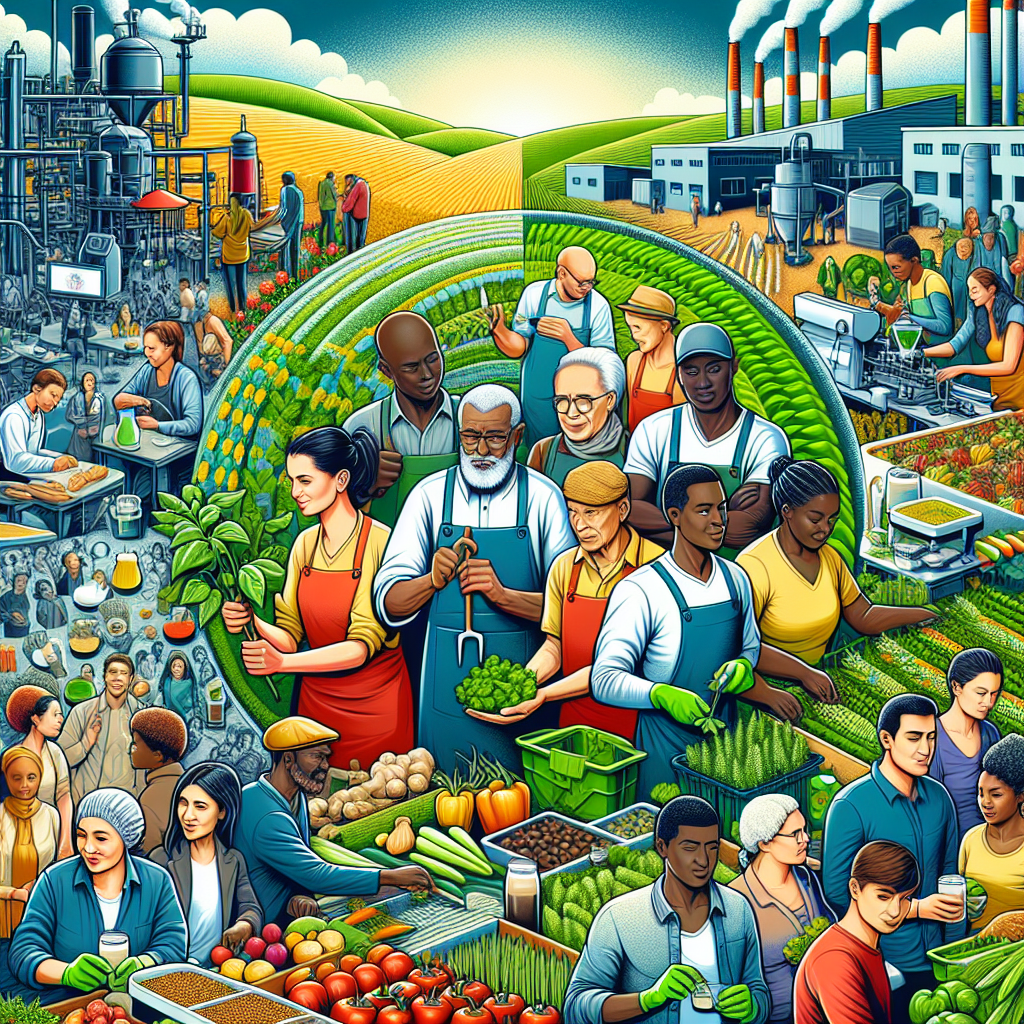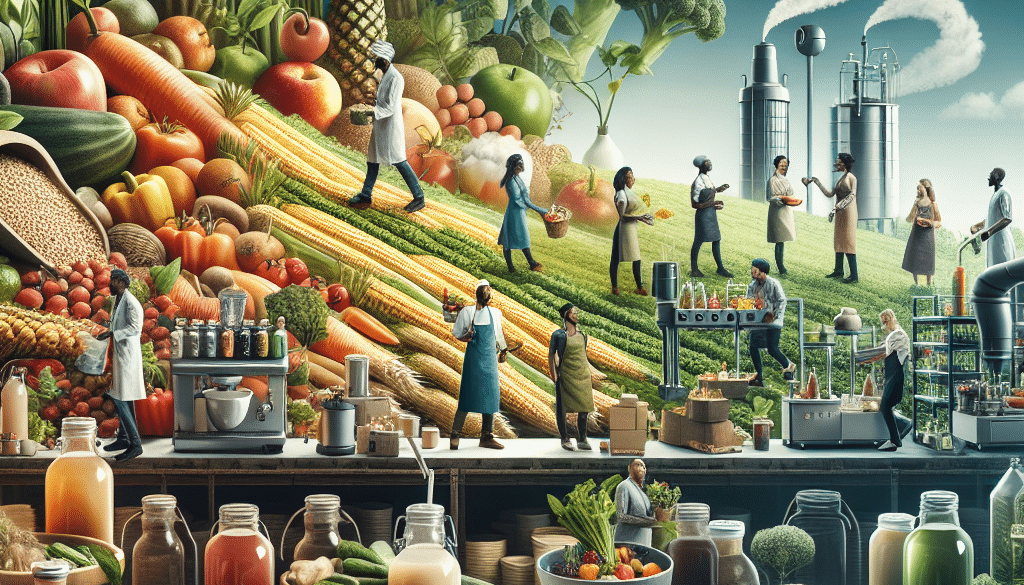Growing Sustainability Across the Food and Beverage Industry
-
Table of Contents
- Sustainable Growth in the Food and Beverage Industry
- The Imperative for Sustainability
- Strategies for Sustainable Practices
- Resource Efficiency and Waste Reduction
- Sustainable Sourcing
- Green Packaging Solutions
- Plant-Based Alternatives
- Case Studies of Sustainable Innovation
- Unilever’s Sustainable Living Plan
- Starbucks’ Greener Stores Initiative
- Patagonia Provisions’ Regenerative Organic Agriculture
- Statistics Highlighting the Impact
- Conclusion: The Road Ahead for Sustainable Food and Beverage
- ETprotein: Championing Sustainable Protein Solutions
Sustainable Growth in the Food and Beverage Industry

The food and beverage industry is at a critical juncture where sustainability is no longer a choice but a necessity. With the global population projected to reach 9.7 billion by 2050, the demand for food and beverages is set to soar, placing an unprecedented strain on natural resources. This article delves into the growing importance of sustainability within the industry, exploring innovative practices, case studies, and the role of companies like ETprotein in fostering a greener future.
The Imperative for Sustainability
Sustainability in the food and beverage industry encompasses a range of practices aimed at reducing environmental impact, ensuring ethical supply chains, and promoting health and wellness. The urgency for these measures stems from several factors:
- Climate change and its impact on agriculture and food production
- Depletion of natural resources such as water and arable land
- Consumer demand for ethically sourced and environmentally friendly products
- Regulatory pressures to reduce carbon footprints and waste
Addressing these concerns is not only environmentally responsible but also increasingly seen as a competitive advantage and a driver of innovation.
Strategies for Sustainable Practices
Companies across the food and beverage sector are adopting a variety of strategies to enhance their sustainability credentials:
Resource Efficiency and Waste Reduction
Efficient use of resources and minimizing waste are fundamental to sustainable operations. This includes optimizing water usage, reducing energy consumption, and implementing comprehensive recycling programs. For example, multinational beverage company Coca-Cola has committed to replenishing 100% of the water it uses in its beverages and production, a goal it achieved in 2016.
Sustainable Sourcing
Ensuring that raw materials are sourced responsibly is crucial. This involves supporting fair trade practices, preserving biodiversity, and using certified sustainable ingredients. Nestlé, for instance, has made strides in sourcing 100% of its cocoa and coffee sustainably by working closely with farmers and suppliers.
Green Packaging Solutions
Reducing packaging waste through innovative design and materials is another key area. Biodegradable, compostable, and recyclable packaging options are becoming more prevalent. PepsiCo has pledged to make 100% of its packaging recyclable, compostable, or biodegradable by 2025.
Plant-Based Alternatives
The rise of plant-based diets has led to a surge in demand for meat and dairy alternatives, which generally have a lower environmental footprint. Companies like Beyond Meat and Impossible Foods are leading the charge in creating plant-based products that appeal to a broad consumer base.
Case Studies of Sustainable Innovation
Several companies stand out for their commitment to sustainability:
Unilever’s Sustainable Living Plan
Unilever’s Sustainable Living Plan is a blueprint for decoupling business growth from environmental impact. The company aims to halve its environmental footprint by 2030 while improving the health and well-being of more than a billion people.
Starbucks’ Greener Stores Initiative
Starbucks has committed to designing, building, and operating 10,000 “Greener Stores” globally by 2025, focusing on energy efficiency, renewable energy, water stewardship, and waste reduction.
Patagonia Provisions’ Regenerative Organic Agriculture
Patagonia Provisions, an offshoot of the outdoor clothing company, is pioneering regenerative organic agriculture practices that restore soil biodiversity, improve water retention, and sequester carbon.
Statistics Highlighting the Impact
The effectiveness of sustainable practices is underscored by compelling statistics:
- A study by the Carbon Trust found that companies with sustainability plans have the potential to reduce energy costs by up to 20%.
- According to the Ellen MacArthur Foundation, circular economy practices could generate $700 billion in savings for the global food system.
- The Plant Based Foods Association reports that plant-based food sales grew 11% in 2019, outpacing total food sales.
Conclusion: The Road Ahead for Sustainable Food and Beverage
The food and beverage industry’s journey towards sustainability is ongoing, with innovation and consumer demand driving change. Companies that embrace sustainable practices are likely to see benefits in terms of cost savings, brand reputation, and regulatory compliance. As the industry evolves, it will be crucial for businesses to continue investing in sustainable technologies and processes that safeguard the planet for future generations.
ETprotein: Championing Sustainable Protein Solutions
ETprotein is at the forefront of providing sustainable protein products that cater to the growing demand for environmentally friendly and health-conscious food options. Their range of organic bulk vegan proteins and L-(+)-Ergothioneine (EGT) products are non-GMO, allergen-free, and boast high purity levels, making them ideal for various industries, including food and beverage.
By choosing ETprotein’s plant-based proteins, companies can reduce their environmental impact while offering consumers the nutritious and sustainable products they seek. For more information on how ETprotein can enhance your product offerings with their high-quality proteins, contact sales(at)ETprotein.com today.
About ETprotein:
ETprotein, a reputable protein and L-(+)-Ergothioneine (EGT) Chinese factory manufacturer and supplier, is renowned for producing, stocking, exporting, and delivering the highest quality organic bulk vegan proteins and L-(+)-Ergothioneine. They include Organic rice protein, clear rice protein, pea protein, clear pea protein, watermelon seed protein, pumpkin seed protein, sunflower seed protein, mung bean protein, peanut protein, and L-(+)-Ergothioneine EGT Pharmaceutical grade, L-(+)-Ergothioneine EGT food grade, L-(+)-Ergothioneine EGT cosmetic grade, L-(+)-Ergothioneine EGT reference grade and L-(+)-Ergothioneine EGT standard. Their offerings, characterized by a neutral taste, non-GMO, allergen-free attributes, with L-(+)-Ergothioneine purity over 98%, 99%, cater to a diverse range of industries. They serve nutraceutical, pharmaceutical, cosmeceutical, veterinary, as well as food and beverage finished product distributors, traders, and manufacturers across Europe, USA, Canada, Australia, Thailand, Japan, Korea, Brazil, and Chile, among others.
ETprotein specialization includes exporting and delivering tailor-made protein powder and finished nutritional supplements. Their extensive product range covers sectors like Food and Beverage, Sports Nutrition, Weight Management, Dietary Supplements, Health and Wellness Products, and Infant Formula, ensuring comprehensive solutions to meet all your protein needs.
As a trusted company by leading global food and beverage brands and Fortune 500 companies, ETprotein reinforces China’s reputation in the global arena. For more information or to sample their products, please contact them and email sales(at)ETprotein.com today.












